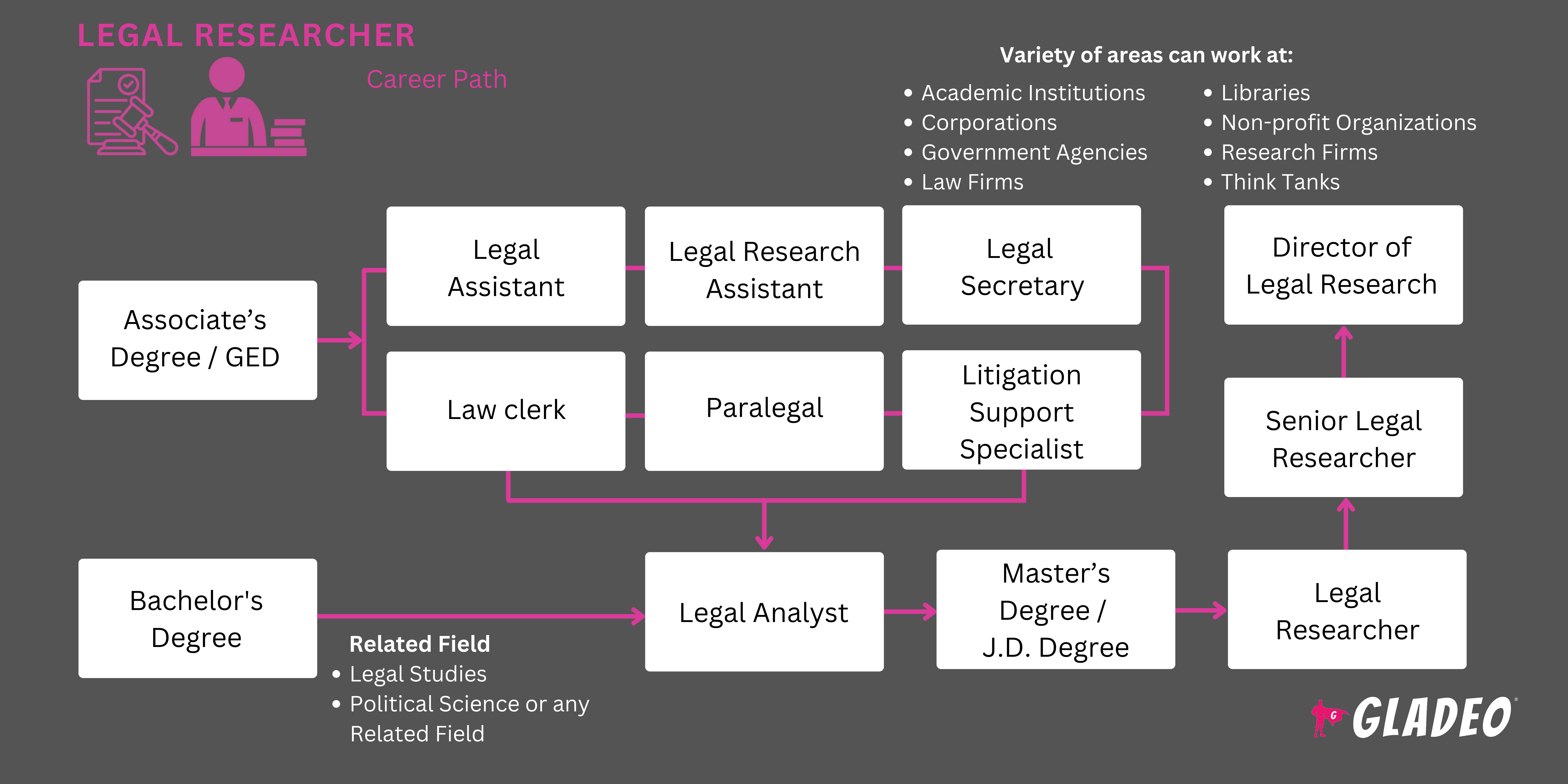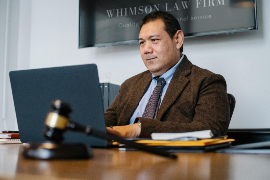Focos de atención
Law Clerk, Legal Analyst, Legal Research Specialist, Legal Research Assistant, Legal Researcher/Writer, Legal Research Consultant, Legal Research Associate, Legal Information Specialist, Legal Research Librarian
Legal Content Specialist, Legal Investigator
Attorneys get paid a lot of money by their clients because they’re expected to win legal battles! But winning in court is no easy task. Many cases are incredibly complicated, requiring vast amounts of research and preparation. Often there’s too much work for a single attorney, which is when they turn to Legal Researchers for support.
Legal Researchers dive into case law and other materials to find information attorneys can use to devise strategies. They may work with Law Librarians and other professionals to comb through statutes, casebooks, court opinions, records, regulations, databases, and legal “fine print.”
These researchers, sometimes called law clerks, may work in law schools, private firms, corporate legal departments, government agencies, and other settings. Although they are behind the scenes, their efforts often make the difference between winning and losing a case.
- Helping others locate pertinent legal information
- Enabling access to accurate legal resources
- Supporting attorneys’ work to improve their odds of winning cases
- Working in a dynamic, intellectually stimulating environment
Horario de trabajo
- Legal Researchers typically work full-time office hours, with overtime possible. They may have to travel to obtain physical materials.
Tareas típicas
- Conduct thorough legal research using statutes, codes, casebooks, court opinions, rules, records, regulations, journals, handbooks, databases, and dictionaries
- Analyze and summarize legal information to support attorneys in preparing for trials, hearings, and depositions
- Prepare legal research reports, memoranda, briefs, and other documents
- Work closely with attorneys, providing expert insights and recommendations
- Review legal catalogs and stay updated with new resources
- Borrow materials from libraries to supplement research resources
- Traveling to various sites to obtain legal documents or materials
- Maintain strict confidentiality of sensitive legal information and adhere to ethical standards
Responsabilidades adicionales
- Train and supervise assistants, staff, and volunteers, as needed
- Stay current with developments in legal research techniques and technologies
Habilidades blandas
- Adaptabilidad
- Analítica
- Atención al detalle
- Colaboración
- Habilidades de comunicación
- Coordinación
- Pensamiento crítico
- Toma de decisiones
- Iniciativa
- Habilidades interpersonales
- Capacidad de organización
- Percepción
- Resolución de problemas
- Capacidades de investigación
- Buen juicio
- Gestión del tiempo
Habilidades técnicas
- Ability to analyze legal documents and regulatory information
- Familiarity with court docket systems
- Knowledge of research methodologies, legal software, and online resources (e.g., HeinOnline, JSTOR, PACER, Westlaw, LexisNexis, etc.)
- Legal citation and referencing styles
- Strong legal writing skills
- Using law library tools and databases
- Corporate legal departments
- Organismos gubernamentales
- Despachos de abogados
- Law schools
- Public law libraries
Legal Researchers are vital members of the legal profession! They play a crucial role in assisting lawyers by providing valuable support in various aspects of legal research. Because their help is so important, they must stay current with legal developments and emerging technologies, which requires continuous learning.
They sometimes work under tight deadlines while juggling multiple tasks at once. Due to the nature of their work, they have to maintain strict confidentiality and ethical standards.
Legal Researchers increasingly use technology to enhance their efficiency and effectiveness.
For example, artificial intelligence (AI) can be used for predictive analytics, such as reviewing past case outcomes to predict future case results. AI-driven tools also help researchers understand complex legal texts and can automate the review of legal materials, reducing the time spent on these tasks.
Another growing trend is the development of digital libraries which can store vast amounts of resources, accessible 24/7.
Legal Researchers likely enjoyed reading and doing in-depth research into complex topics. They may have been highly organized growing up, with a keen interest in helping others. Many participated in debate clubs, library clubs, or similar activities.
- Some Legal Researchers start out as paralegals or legal assistants, which usually requires a minimum of an associate degree
- Paralegals often become certified through NALA or the American Alliance of Paralegals, Inc.. They can add to their credentials by completing legal research programs such as Lew & Clark Law School’s Prepare to Practice: Legal Research certification program or Thomson Reuters’ Westlaw research certifications
- Legal Researchers frequently pursue a bachelor’s or master’s related to legal studies. Many even finish a Juris Doctor degree. This isn’t necessarily required but it can make applicants more competitive and potentially qualify them for more advanced roles!
- Relevant college course topics include:
- Derecho mercantil
- Comunicaciones
- Gestión de bases de datos
- Dispute resolution
- Family law
- Information organization and management
- Intellectual property law
- Legal research methods
- Legal writing and citation
- Students should complete internships at law firms or law libraries to gain practical experience
- Legal Researchers can join the American Association of Law Libraries or other organizations to access continuing education resources, scholarships, and networking opportunities
- Legal Researchers often get started with an associate degree, though a bachelor’s is better. Many students finish undergraduate degrees in legal studies. These degrees are very suitable for online and hybrid study.
- Check out the faculty biographies to learn about their expertise in the field.
- Review the job placement rates for graduates.
- Comparar los costes de matrícula y tasas, teniendo en cuenta los costes para los residentes en el estado y para los que no lo son.
- Review scholarship and financial aid options, including federal aid Pell Grants.
- High school classes in English, writing, history, business, and computer science are useful
- Engage in activities that involve research and group collaboration
- Gain practical experience through part-time jobs, volunteer work, or internships
- Keep up with industry trends related to new technologies such as AI
- Watch YouTube videos about legal research
- Read articles and journals like the Journal of Legal Studies
- Try to set up an informational interview with a Legal Researcher to ask questions
- Keep track of your accomplishments on a draft resume

- Apply for law-related internships or apprenticeships to gain practical experience and make connections
- Consider starting as a paralegal or assistant while working on your bachelor’s
- Sign up for alerts on job portals like SimplyHired, Indeed, Monster, and Glassdoor
- Pida a las personas de su red que le den consejos sobre ofertas de trabajo
- Reach out to local law firms to inquire about upcoming openings
- Request former professors and supervisors to serve as your personal references. Be sure to get their permission before giving out their contact information
- Utiliza el centro de carreras de tu escuela para que te ayuden con los currículos y los simulacros de entrevistas
- Check out Legal Researcher resume samples and sample interview questions
- Make sure your resume is error-free, concise, and up-to-date
- Learn how to make an amazing first impression!
- Review Indeed’s How to Dress for an Interview
- Talk with your supervisor about promotion or pay raise opportunities
- Pursue certifications or additional training relevant to legal research, such as advanced research methodologies or legal technology tools
- Consider earning a Juris Doctorate if it’ll help qualify you for advancement
- Train and mentor new Legal Researchers and assistants
- Provide outstanding service to the attorneys you assist to ensure positive experiences
- Stress accuracy and confidentiality at all times
- Take on leadership roles within professional organizations or committees to gain visibility and influence. Attend conferences to stay updated on trends
- Set goals for continual process improvement, such as incorporating new technologies
- Publish articles or papers in legal journals to establish yourself as an expert in the field
- Develop specialized expertise in a particular area of law
- Volunteer for high-visibility projects or committees within your organization
- Build a strong professional network by connecting with other legal researchers
- Seek feedback from colleagues and supervisors to identify areas for improvement
Páginas web
- AALL Spectrum
- Asociación Americana de Bibliotecas Jurídicas
- American Law Reports
- Asociación para la Ciencia y la Tecnología de la Información
- Asociación de Colecciones y Servicios Técnicos de Bibliotecas
- Asociación de Bibliotecas Universitarias y de Investigación
- Case Western Reserve Journal of International Law
- Consorcio de Centros de Medios de Comunicación de Colegios y Universidades
- Cornell Legal Information Institute
- Harvard Civil Rights – Civil Liberties Law Review
- Harvard Environmental Law Review
- Harvard International Law Journal
- Harvard Journal of Law & Technology
- Harvard Journal on Legislation
- Harvard Law & Policy Review
- Harvard Law Review
- International Association of Law Libraries
- Journal of Civil Law Studies
- Journal of Empirical Legal Studies
- Justia
- Derecho.com
- Law Library Journal
- Law Library Microform Consortium
- Legal Information Management
- Legal Information Preservation Alliance
- LLRX.com
- Medical Law Review
- Modern Law Review
- Asociación Nacional de Profesionales de Apoyo Jurídico
- National Association of Legal Investigators
- Notre Dame Journal of Law, Ethics & Public Policy
- Oxford Journal of Legal Studies
- Asociación de Bibliotecas Especiales
- Syracuse Journal of International Law and Commerce
- Syracuse Law Review
- The Journal of Legal Studies
Libros
- How To Learn And Memorize Legal Terminology Paperback, by Anthony Metivier
- Legal Research: How to Find & Understand the Law, by Editors of Nolo
- Reading Legal Writing 101: The Essential Guide to Clearly and Accessibly Understanding the Fundamentals of Law Language, by Stephen Wade
Legal Researchers are crucial to the legal profession, but the work may not appeal to everybody. For those who want to explore other career options, consider jobs such as:
- Academic Librarian
- Archivero
- Abogado
- Secretario judicial, municipal y de licencias
- Court Reporter and Simultaneous Captioner
- Asistente ejecutiva
- Profesor de secundaria
- Historiador
- Information Scientist
- Coordinador pedagógico
- Asistente jurídico
- Especialista en historiales médicos
- Museum Worker
- Title Examiner
- Escritor
Newsfeed

Trabajos destacados

Cursos y herramientas en línea








